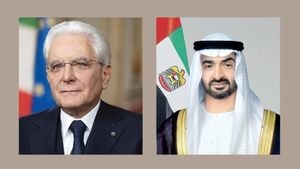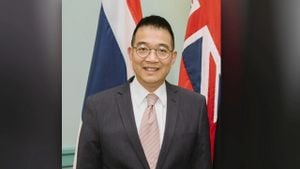The Alternative for Germany (AfD) has emerged as the clear victor of the Bundestag election held on September 24, 2025, across Mecklenburg-Vorpommern, securing approximately 35% of the vote. This result marks a significant increase from their performance in 2021, nearly doubling their previous share of 18%. With this victory, the AfD has successfully unseated the Social Democratic Party (SPD), which garnered only around 12.4% of the votes, its worst ever result at the federal level.
Ministerpräsidentin Manuela Schwesig, who leads the SPD, acknowledged the party's defeat, stating, "Die SPD hat nicht in den letzten zwei Wochen verloren, sondern in den letzten zwei Jahren." The shift reflects growing dissatisfaction among voters with the incumbent government, particularly surrounding issues of immigration and economic stability.
Throughout the election, the AfD has demonstrated its appeal to constituents, winning all six electoral districts within the state. Their success is particularly notable as they received the majority of votes not only from their traditional base but also from disenchanted voters across the political spectrum. AfD Landeschef Leif-Erik Holm expressed pride over the results, asserting, "Wir haben die nächste Raketenstufe gezündet in unserer Entwicklung." This victory positions the AfD strongly for the next state elections as well.
Beyond the AfD's triumph, the election results have sparked significant concern among the other parties. The Christian Democratic Union (CDU) was only able to achieve about 17.8% of the vote, only marginally improving from their performance four years prior. CDU leader Daniel Peters emphasized the need for his party to reclaim its leadership role, asserting, "Egal wer jetzt mit uns koalieren will, der muss sich nach uns richten." He indicated plans to solidify the CDU's influence, particularly around issues of migration and economic policy.
The Left party also made moderate gains, capturing around 12.1% of the vote, and attributing its success to being closely aligned with the voters' everyday concerns. Hennis Herbst of the Left party pointed out, "Die Linke war nah an den Leuten und hat die alltäglichen Probleme thematisiert." The strong response against social inequalities and challenging economic conditions displayed by these parties has fueled the electoral dynamics.
The Greens faced significant losses, polling around 5.4%, compared to 7.8% the previous election. Their candidate, Claudia Müller, highlighted the need for all parties to unite around viable solutions for the region saying, "Wir müssen gute Lösungen für Mecklenburg-Vorpommern präsentieren und die dann auch schnell umsetzen." The election results have incited discussions on the future direction of the party following this electoral setback.
This election also showcased preliminary trends unique to Mecklenburg-Vorpommern. Despite broader national elections reflecting different outcomes, regional voters have shown distinct preferences. The high voter engagement of approximately 79% suggests deep political interests among the populace, even amid shifting political landscapes.
The electoral reform implemented prior to this election had major impacts on how the results translate to parliamentary representation. It requires parties to gather sufficient secondary votes to convert their first-place candidates directly to parliamentary mandates. The AfD can expect to send five candidates directly to the Bundestag from the six districts they won. This feature of the new electoral rules contributes to the complexity and strategic planning necessary for this upcoming legislative term.
Looking forward, the SPD needs to undergo considerable internal restructuring to regain its footing, with Schwesig calling for significant reforms within the party. Nationally, discussions about forming coalitions are already underway, with CDU's Friedrich Merz entering negotiations to establish a new government as he stated, "Jetzt liegt die Verantwortung bei uns, dieses Land zu führen."
With the AfD stepping solidly onto the political stage, the dynamics of governance and policy-making across Germany are set for notable changes. The next few months will be pivotal as parties navigate this new political reality, sparking dialogue about issues pressing to the electorate and the challenges surrounding governance amid increased right-wing populism.



